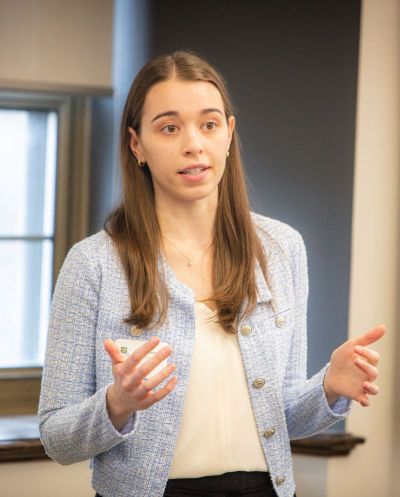Ready, Set, Speak: The 3MT® Competition Challenges CSAHS Grad Students to Share Their Thesis in Just 3 Minutes

What happens when you give graduate students just three minutes and a single slide to share the heart of their research? You get the Three-Minute Thesis (3MT®) Competition, a dynamic, university-wide showcase that highlights the breadth and brilliance of graduate research in a format designed to captivate.
This isn’t about dumbing down complex ideas; it’s about honing the skill of translating deep, discipline-specific work into clear, compelling narratives that resonate far beyond the lab or lecture hall. Whether it's creative activity or cutting-edge discovery, participants must distill their message for a panel of non-specialist judges—and, ultimately, for the broader public.
Each college hosts its own preliminary round, selecting two standout presenters that advance to the University of Guelph’s 3MT® Final Competition on April 24, 2025. The final will be held in person and will include a Community Choice Award, giving the public a chance to vote for their favourite presentation.
The top presenter will go on to represent the University of Guelph at the 2025 Provincial Finals on May 14, 2025, hosted by the University of Toronto.
The CSAHS College Heat Final Results
The 3MT College Heat for the College of Social & Applied Human Sciences (CSAHS) was held on Friday, April 11, 2025. Five participants showcased research directly related to their graduate thesis work.

First Place — Tamara Petresin, PhD Applied Human Nutrition
An Innovative Approach to Food Access: Unlocking the Power of Community
Tamara’s research highlights the challenges of food insecurity in Canada, emphasizing that the issue isn't a shortage of food but a lack of access—especially for nearly 20% of families. Traditional food programs often fall short because they are designed for communities, not with them. Tamara introduces a new approach through research on co-design, a collaborative process involving researchers, community members with lived experience, and local organizations. Her findings showed that people valued choice, cultural relevance, social connection, and a sense of ownership. When communities lead, solutions become more effective, equitable, and sustainable—shifting the focus from top-down aid to shared leadership and long-term change.
“Food insecurity isn't just about food — it's about equity, dignity, and shared leadership. When communities lead, solutions are stronger."
Second Place — Halah Abu-Omar, MA Psychology
To Share or Not to Share: The Impact of Supervisor Self-Disclosure on Employee (Felt) Trust
Halah’s research explores the impact of supervisors sharing personal information—known as self-disclosure—on workplace trust. Halah shows that building trust as a leader requires careful balance: while some personal sharing can strengthen relationships, oversharing or sharing the wrong type of information can damage trust and make employees feel less valued. Halah suggests that leaders should share thoughtfully and build trust by showing employees that they are valued and capable.
“Oversharing can actually backfire—leaders should build trust not by revealing more about themselves, but by showing employees they’re valued, capable, and trusted.”
Third Place — Julia Leary, MA Public Issues Anthropology
Crossing Borders and Navigating Dreams
Julia’s research focuses on understanding the complex and evolving decision-making processes of international students in Ontario. Julia discusses how international students’ decision-making is complex and deeply personal, shaped by a range of cultural, social, and individual factors. Understanding these experiences through qualitative research is essential for creating more informed, supportive, and human-centered policies and services in higher education.
“This data is needed to inform our decision making and to help humanize the stories and dreams behind statistics on international students.”
Corey Wood, MA Industrial-Organizational Psychology
Unravelling the Job Search Journey: Exploring the Dynamics of Job Search Motivation Through a Candidate Needs Lens
Corey’s research compares the job search journey to a road trip without a map—it is filled with detours, frustration, and dwindling confidence. The research explores how job seekers' motivation and confidence are shaped not just by internal factors but also by their experiences during the hiring process. Corey found that small, intentional changes by employers—like timely responses or personalized feedback—can significantly improve job seekers’ confidence, leading to better outcomes for everyone.
“The journey is already difficult enough for job seekers—employers have the power to illuminate the path or make the road harder to follow.”
Rachel Appiah, PhD Psychology
Authenticity at Work
Rachel’s research explores the concept of authenticity in the workplace, using the metaphor of standing before glass doors—where opportunities are visible but feel just out of reach—to illustrate the struggle many face in fully showing up as themselves. While authenticity is often celebrated for boosting engagement, performance, and well-being, Rachel’s research goes further to examine how authenticity is perceived and shaped by the surrounding environment. Their research emphasizes that authenticity isn’t just an individual trait but a shared, dynamic experience shaped by workplace culture and leadership.
“Being authentic isn’t just about the individual—it’s about the environment, the signals we send, and how our spaces make it safe to be real at work.”
Congratulations to all participants for their exceptional presentations and to the winners of the 2025 CSAHS College Heat! Best of luck to Tamara and Halah as they represent CSAHS and advance to the next round at the Campus Finals on April 24, 2025. For more information on the upcoming Campus Finals, visit the 2025 3MT - Three Minute Thesis website.